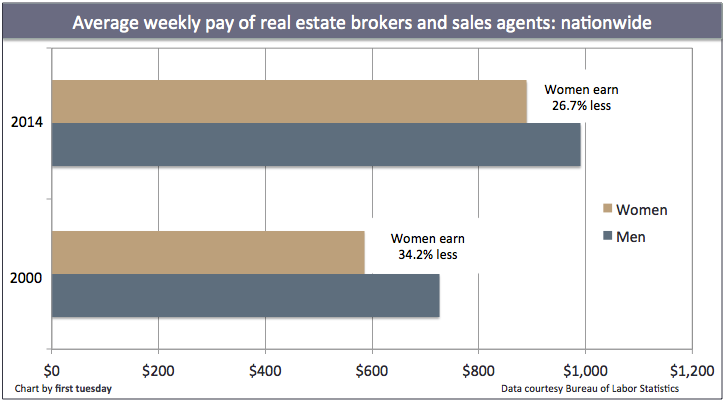Women in the real estate industry earn less — much less — than men. Why? And what can be done to bridge the gap?
In your experience, do female, full-time real estate professionals earn less than their male counterparts?
- No (I am a male real estate professional). (53%, 37 Votes)
- Yes (I am a female real estate professional). (21%, 15 Votes)
- No (I am a female real estate professional). (19%, 13 Votes)
- Yes (I am a male real estate professional). (7%, 5 Votes)
Total Voters: 70
Numbers don’t lie
Any way you spin it, women earn less than men across the vast majority of professions. This dynamic is called the gender wage gap, and the real estate industry is not immune.
First, the average wage gap for all industries is apparent in the weekly earnings of men and women working full-time nationally, with:
- men earning an average of $889 per week as of the third quarter (Q3) of 2015; and
- women earning an average of $721 per week.
That’s a difference of 19%, or:
- $168 per week;
- $672 per month; or
- $8,736 per year, according to the Bureau of Labor Statistics (BLS).
When you look at individuals employed as full-time real estate brokers or sales agents, the difference in pay becomes wider, with:
- men earning an average weekly pay of $991; and
- women earning an average weekly pay of $726.
That’s a difference of 27%, or;
- $265 a week;
- $1,060 a month; or
- $13,780 a year, according to the BLS.
As a matter of fact, the real estate profession experiences one of the highest gender pay disparities — the seventh highest as of 2000. This places it below chiropractors and just above physicians. (The lowest gender wage gap is found amongst U.S. postal workers).
The average yearly income for a real estate agent in California is $58,180 as of 2014, according to the BLS. Applying nationwide data on real estate earnings by gender, the average full-time real estate income in California is around:
- $67,700 for male agents and brokers; and
- $49,600 for female agents and brokers.
Of course, this number is higher for brokers and lower for agents. Further, it needs to be said that location and price tier skew earnings dramatically.
Editor’s note — The highest-paid real estate agents and brokers in California live and work in the Los Angeles metropolitan area, with men and women earning an average of $66,000 per year.
Why the gap exists
Research shows the gender gap is mainly a product of implicit bias on behalf of employers — and clients, in the case of real estate. It’s implicit because employers and/or clients don’t usually intend to pay female workers less than male workers, but their hidden expectations, assumptions and attitudes cause women to generally receive less pay than men (a condition that is not unique to real estate).
For real estate, these implicit biases are played out in three ways:
- the broker’s desire to hire more men than women;
- the perception of both employing brokers and female agents about negotiation; and
- the expectation that women will devote less time to work due to family duties.
First, despite the relatively high gender wage gap in real estate, there are more women working as full-time agents or brokers than there are men — 57% are women, in fact. A wider-than-usual pay gap is actually a common trend experienced across industries which employ more women than men.
Industries with a greater percentage of female workers tend to overpay male workers to a larger extreme than in industries where the split is even or heavy on men, according to a BLS report. Think of it as a supply-and-demand issue; as there are fewer men working in an industry, an employer may choose to pay their male employees more than their female employees in order to keep the office at a stable male-female ratio.
However, the gender gap exists across all industries — not just those with men in short supply, though it is particularly stark there.
The second reason why the gender wage gap exists (particularly in real estate) is due to perceptions about women negotiating. Specifically, research tells us women don’t feel comfortable negotiating for better pay or higher fee splits — mostly due to their employer’s perception of their negotiating tactics.
The Harvard Business Review describes how women who negotiate for higher incomes pay a higher social cost than men who negotiate. That is, the employer interviewing a woman who negotiates for higher pay is less inclined to work with her after the interview than when a man negotiates. Women perceive this situation correctly, and often avoid negotiating or negotiate passively (ineffectively) to ensure they don’t leave a negative perception with an employer.
As a catch-22 for real estate, the Harvard Business Review also points out that women are viewed in the most positive light when they negotiate — not for themselves — but for others. Therefore, female real estate agents who negotiate on behalf of their clients are viewed most positively. In this context, this behavior is widely construed as assertive rather than cutthroat (which happens when they negotiate on their own behalf).
Third, employers expect women to devote less time to their job than their male counterparts, particularly during their middle-age years when they are assumed to take time off for child-rearing duties.
For evidence, the wage gap is highest between men and women during typical childbearing years (twenties and thirties), and levels out as men and women approach retirement age, according to the BLS. The author of the BLS study suggests women need more access to jobs with flexible schedules to allow them to juggle home responsibilities with work responsibilities. However, this misses the point, as obviously real estate’s “flexible” scheduling does not eliminate the pay gap, though it may be part of the reason why it is a female-dominated field.
Each of these biases work to hold down the pay of female workers — but it is getting better.
Improvements on the gender pay gap
The good news for California professional women is that the gender pay gap in California is actually smaller than the national average, with women across industries earning:
- 10.7% less than men in California; compared to
- 17.5% less than men nationwide.
Editor’s note — Washington, D.C. has the smallest gap across industries of only 4%, likely due to the high number of government jobs, which are more strictly scrutinized for discriminatory employment practices. The highest gap is in Wyoming, where women earn a staggering 42% less than their male counterparts.
Further, this gap has decreased over time. In 2000, women working as real estate agents or brokers earned 34% less than male agents and brokers, nationwide. This figure has decreased steadily to 2014’s difference of 26.7%. Thus, the outlook continues to improve for female agents and brokers:
Strategies to decrease the gap
What can brokers and agents do in the real estate industry to decrease the gender pay gap?
The first (and easiest) thing a proactive broker or agent can do is acknowledge the average pay difference exists. Even if a broker strives to keep fee splits equal in their office doesn’t mean that a systemic problem doesn’t exist for the industry as a whole. Further, it’s not always within the broker’s control to address the pay gap — sometimes the pay gap is due entirely to clients, some of which may prefer male agents over female agents due to their own implicit biases, and some of which may expect a female agent to agree more readily to a lower fee.
Therefore, even if the gap isn’t immediately apparent to a broker or agent, it doesn’t mean it’s not a real phenomenon that ought to be addressed.
The more difficult task is left to women in the real estate profession. The best thing they can do for their pay is to negotiate for the best fee split possible — just as they would negotiate for the very best advantage for their client.
Many women (and men) are nervous about negotiating, since they may appear aggressive or unlikeable to the broker, someone with whom they will be working with regularly if employed.
However, there are ways to get the type of fee split which an agent’s experience and skills command, without getting on the bad side of the employing broker.
- Inform the broker of your intention to negotiate, and highlight that your job as a real estate agent requires you be a strong negotiator. Let them see your negotiating skills in action.
- When asking for a better fee split or higher compensation, concretely express why you deserve it. For instance, do your years of experience set you apart? Or did you recently upgrade your sales person license to that of a broker? Has your sales pace increased over the past year? Don’t ask for a raise or a better split just because you want more money, ask because your experience and qualifications clearly justify it.
- Help the employing broker understand why the raise or better fee split will actually work in their favor. For instance, with the security of a higher fee split, you are able to devote more of your time to mentoring the new sales agents the broker has recently brought on; a win-win situation for you and the broker.
It’s key for women negotiating their way into higher pay to remind the employing broker — or the client — that they are on the same team with compatible goals.
Everyone wants the same thing at the end of the negotiation — to buy and sell houses (and make a living doing it if they are a broker or sales agent). Even if the woman vying for higher pay feels as if she is on opposing sides with the broker or client in the instance of pay, it’s important to keep in mind that they are on the same team. This will help quell that implicit bias and make a profitable split more likely.
Agents and brokers: What is your experience with differences in pay for women and men? Share your thoughts in the comments below!





















There’s just one problem………………….REAL ESTATE IS FULL COMMISSION!
In brilliant ironic fashion, you quite literally just debunked your own argument with the example you used to support it. One has to imagine if you’re not really on the side of your opposition publishing mistakes like this.
You proved the opposition to the pay gap myth: There is a distinction to be made between TOTAL EARNINGS and WAGES AND SALARIES. The best domain to run the experiment is real estate or entrepreneurialism because there is no wage and no salary. It’s full-commission. Your earnings are proportional to how long you work. Lo and behold – men work longer hours because they want to. When you survey them, they say that’s what they want. When you survey women, by and large they don’t want to work this often. Chalk it up to prenatal testosterone distribution and competitiveness or relentless drive, or whatever you want, but it sure isn’t the mythical made-up patriarchy oppressing women.
gentlepersons, with all due respect to the great amount of work in the article…it’s hogwash. The real estate brokerage business is commission remuneration. Irrespective of your gender earning are directly related to education, experience, talent, skills and abilities, sphere of influence and time invested. Brokering & consulting & teaching since the sixties, some women I know out perform men dizzy-fast to escrow. Let the fedz stuff their stats…just funny money correlation – bureaucratic dilusion – and for what purpose…ZIP!
This article is virtually fact free. Where is the data to support any conclusion of bias? None presented.
Why not acknowledge the fact that there are more part-time female brokers than male? That fact alone explains the entire difference in annual incomes.
No males do not earn more than female real estate agents. Depends on personality, assertiveness, territory, etc. One month I made just $10,000 short of a quarter million.
The fact that the DRE would even concern itself with the gender thing is beyond my comprehension. I just finished renewing my license and was disgusted with the political bias throughout many of the chapters, especially the opinions of those referring to prop tax protection. I say let the cream rise to the top and quit crying fowl!!
Why not Grandfather every Agt., where they are and require a B o Arts or Masters Degree for a Real Estate Broker Designation ?
I’ve been a broker for thirty years. There are more female agents than males, and they receive the same commissions and splits that men do, so I estimate that women earn more than men in the real estate brokerage industry.
If construction is included then it skews toward men since men are stronger and can lift more (generally).
Agreed & Females get a Boost from the Public from Women & Insecure Men